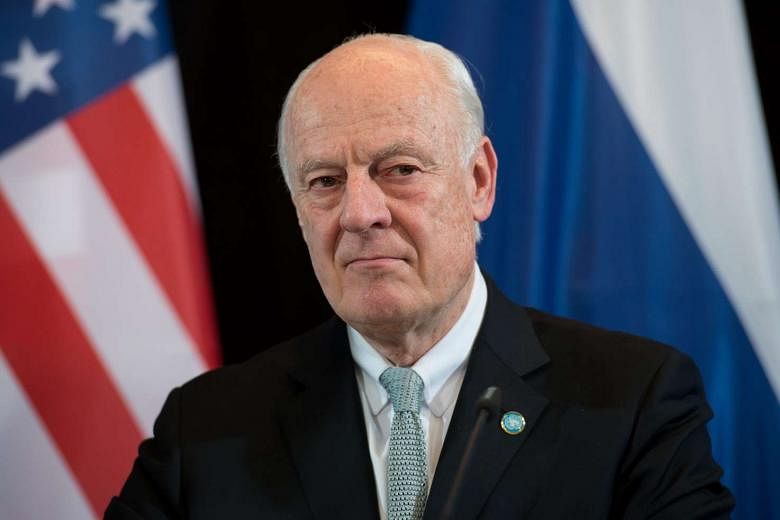DAMASCUS - The United Nation's peace envoy for Syria, Staffan De Mistura, said on Tuesday (Feb 16) that he has discussed unhindered humanitarian access to besieged Syrian areas with Syria's Foreign Minister Walid al-Moallem, Xinhua news agency reported.
Mistura told journalists following his meeting with the Foreign Minister that they had discussed humanitarian access to all besieged Syrian areas, not only those besieged by the government, but also those under the siege of the opposition and the Islamic State (IS) group as well.
The UN envoy said he will hold another meeting to discuss with Syrian officials the outcome of the recently-held talks in Munich, Germany, where world powers called for immediate aid access throughout Syria and a "cessation of hostilities" to begin within a week.
The outcome of the Munich talks were planned to pave the way for the resumption of the Geneva talks between the Syrian government and opposition, whose first round soon collapsed due to the "lack of progress."
Achieving unhindered humanitarian access and a cessation of hostilities were among a number of preconditions the Syrian opposition set ahead of the first round of talks in Geneva, and the success of materializing those two things would have strengthened the grounds for negotiations. The aim was to help alleviate the suffering of the Syrian people who have been reeling under the pressure of the nearly five-year-old conflict.
The UN said it is gravely concerned about the abhorrent and repeated attacks on medical facilities in the Syrian conflict after four hospitals and a school were hit in airstrikes yesterday. It noted in a statement issued in Geneva on Tuesday (Feb 16) that in Maarat al-Numan, in Idlib Governorate, two hospitals were attacked, including one supported by Doctors Without Borders (Medecins Sans Frontieres). The hospital was reportedly hit by four missiles, which allegedly killed nine people and injured 30 others. The National Hospital in Maarat al-Numan was also hit with three people reported killed and six injured.
A mother-and-child hospital in the town of Azaz, some 30 kilometres from Aleppo, was also struck yesterday, with 13 people killed and dozens injured. The facility, which is supported by the UN, had been previously struck on 25 December 2015. A second hospital in the town, the General Hospital, was also struck with seven killed and 23 injured. Both hospitals are well-known facilities.
Also in Azaz, a school that was sheltering internally displaced people (IDP), was hit in yesterday's strikes, reportedly killing 14 people.
While it is not yet clear whether these facilities were intentionally targeted, the UN said the sheer number of incidents raises huge question marks about the failure of the parties to the conflict to respect the special protections afforded to medical facilities and personnel under international humanitarian law. It said customary international humanitarian law affords special protection to hospitals, medical units and healthcare personnel, and Article 3, common to the four Geneva Conventions of 1949 - which is binding on all parties to the conflict in Syria -- requires the wounded and sick be collected and cared for.
Depending on the circumstances, an airstrike on a hospital may constitute a war crime, said the UN. Intentionally directing attacks against hospitals and places containing the sick and the wounded and against medical units using the Red Cross or Red Crescent emblem is a war crime, in a non-international armed conflict.
Attacks on hospitals and other medical facilities in Syria began as far back as the beginning of 2012, according to the UN. A 13 September 2015 report by the Commission of Inquiry on Syria, entitled "Assault on medical care in Syria" listed an appalling litany of attacks on hospitals and medical units over the past four years as well as numerous examples of the sick and wounded being deliberately denied medical assistance, primarily by Government forces and pro-Government militias.
The report also cited what it termed "one of the most insidious trends of the armed violence in Syria" -- namely the targeting of healthcare personnel, with ambulance drivers, nurses, doctors and medical volunteers attacked, arrested, unlawfully detained, and disappeared.
The escalation of the conflict in and around Aleppo is of grave concern, with civilians continuing to suffer the consequences. Air and ground strikes by different parties - including airstrikes conducted by Syrian and Russian planes, as well as ground operations by Syrian Government forces and their allies, and by armed opposition groups - have led to the destruction of essential civilian infrastructure such as medical facilities and bakeries, rendering life even more difficult for civilians in many towns and villages across the governorate.
As of yesterday, 58,000 IDPs were at the Syrian/Turkish border, many of them in camps, with the figures increasing daily. Several villages in the northern rural part of the governorate are reported to be almost empty due to people fleeing over the last week. The UN said the population of Aleppo is in dire need of an immediate ceasefire and unhindered humanitarian assistance. Without it, the tens of thousands of civilians remaining in towns and villages across the governorate will be left vulnerable to aerial attacks, mass killings, and destruction of the remaining infrastructure and they will be deprived of badly-needed assistance.

